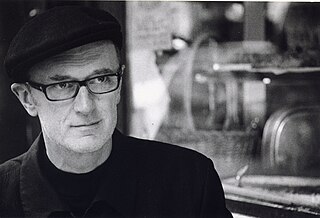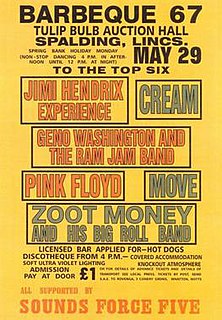This article needs additional citations for verification .(March 2010) (Learn how and when to remove this template message) |

The Azimuth Co-ordinator was the first panning control for a quadraphonic sound system, at that time a new concept. Pink Floyd became the first band to use it in their early shows.
Panning is the distribution of a sound signal into a new stereo or multi-channel sound field determined by a pan control setting. A typical physical recording console has a pan control for each incoming source channel. A pan control or pan pot is an analog control with a position indicator which can range continuously from the 7 o'clock when fully left to the 5 o'clock position fully right. Audio mixing software replaces pan pots with on-screen virtual knobs or sliders which function like their physical counterparts.

A sound reinforcement system is the combination of microphones, signal processors, amplifiers, and loudspeakers in enclosures all controlled by a mixing console that makes live or pre-recorded sounds louder and may also distribute those sounds to a larger or more distant audience. In many situations, a sound reinforcement system is also used to enhance or alter the sound of the sources on the stage, typically by using electronic effects, such as reverb, as opposed to simply amplifying the sources unaltered.

Pink Floyd were an English rock band formed in London in 1965. They achieved international acclaim with their progressive and psychedelic music. Distinguished by their philosophical lyrics, sonic experimentation, extended compositions, and elaborate live shows, they are one of the most commercially successful and influential groups in popular music history.
The Azimuth Co-ordinator uses four rotary rheostats housed in a large box. The rheostats were converted from their standard 270 degrees rotation to operate over the narrower 90 degree range imposed by the physical constraints of the control lever with the box top aperture. The system was operated using two joysticks, which allowed an audio signal to be panned between up to six loudspeakers placed around the hall.
An audio signal is a representation of sound, typically using a level of electrical voltage for analog signals, and a series of binary numbers for digital signals. Audio signals have frequencies in the audio frequency range of roughly 20 to 20,000 Hz, which corresponds to the upper and lower limits of human hearing. Audio signals may be synthesized directly, or may originate at a transducer such as a microphone, musical instrument pickup, phonograph cartridge, or tape head. Loudspeakers or headphones convert an electrical audio signal back into sound.

A loudspeaker is an electroacoustic transducer; a device which converts an electrical audio signal into a corresponding sound. The most widely used type of speaker in the 2010s is the dynamic speaker, invented in 1925 by Edward W. Kellogg and Chester W. Rice. The dynamic speaker operates on the same basic principle as a dynamic microphone, but in reverse, to produce sound from an electrical signal. When an alternating current electrical audio signal is applied to its voice coil, a coil of wire suspended in a circular gap between the poles of a permanent magnet, the coil is forced to move rapidly back and forth due to Faraday's law of induction, which causes a diaphragm attached to the coil to move back and forth, pushing on the air to create sound waves. Besides this most common method, there are several alternative technologies that can be used to convert an electrical signal into sound. The sound source must be amplified or strengthened with an audio power amplifier before the signal is sent to the speaker.
The Azimuth Co-ordinator was operated by keyboardist Rick Wright. As he operated the joystick, the source of the sound moved from speaker to speaker around the auditorium. With the controls in the central position, the sound output would be equal in all speakers.

Richard William Wright was an English musician, composer, singer, and songwriter. He was a founder member, keyboardist, and vocalist of the progressive rock band Pink Floyd, performing on all but one of the group's albums including The Piper at the Gates of Dawn, The Dark Side of the Moon, Wish You Were Here and The Division Bell, and playing on all of their tours.
It was constructed by a technical engineer Bernard Speight at EMI’s Abbey Road Studios. The original was stolen after the first concert in Queen Elizabeth Hall in London, England. A second was built for the concert at the Royal Festival Hall in London on 14 April 1969. It had two pan pots and four channels.

The Queen Elizabeth Hall (QEH) is a music venue on the South Bank in London, England, that hosts daily classical, jazz, and avant-garde music and dance performances. It was opened in 1967, with a concert conducted by Benjamin Britten.

The Royal Festival Hall is a 2,900-seat concert, dance and talks venue within Southbank Centre in London. It is situated on the South Bank of the River Thames, not far from Hungerford Bridge, in the London Borough of Lambeth. It is a Grade I listed building, the first post-war building to become so protected. The London Philharmonic Orchestra, the Philharmonia Orchestra and the Orchestra of the Age of Enlightenment are resident in the hall.
Lost for many years it was found under the aegis of London’s Victoria and Albert Museum, and displayed as part of their Theatre Collections gallery [1] from March 2009. It is also included as part of the V&A's 2017 Their Mortal Remains exhibition. [2]

The Victoria and Albert Museum in London is the world's largest museum of applied and decorative arts and design, as well as sculpture, housing a permanent collection of over 2.27 million objects. It was founded in 1852 and named after Queen Victoria and Prince Albert.

Pink Floyd: Their Mortal Remains is an exhibition on the history of the British rock band Pink Floyd, opening on 13 May 2017 at the Victoria and Albert Museum in London, England, and originally scheduled to run until 1 October. After high visitor numbers, the exhibition's run was extended by two weeks, to 15 October 2017. It followed the V&As successful David Bowie Is exhibition.









